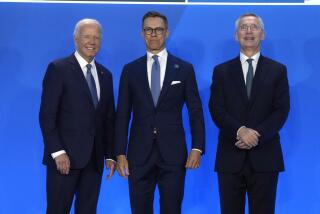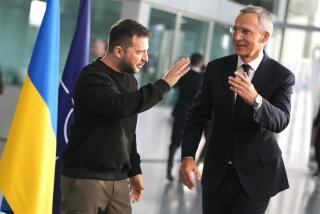U.S. Invites Allies to Aid ‘Star Wars’ : Would Let Other Countries Take Part in Research
- Share via
LUXEMBOURG — Defense Secretary Caspar W. Weinberger today formally invited key allies to join the Reagan Administration’s “Star Wars” space weapons research program, a senior American official said.
Weinberger gave personal letters of invitation to the 12 NATO defense ministers at a nuclear strategy meeting that opened today, said the official, who spoke on condition that he not be identified.
Letters of invitation were also sent to the governments of Japan, Australia and Israel, he said. France, which was not represented at the meeting, also was invited to participate.
Weinberger’s letters asked the allies to respond within 60 days, after which those wanting to take part in the $25-billion, five-year program would enter more detailed talks on “arrangements for cooperation,” he said.
Unanimous Support
The official said the defense ministers at the two-day conference unanimously supported the U.S. research program that is exploring ways of using new high-technology weapons in space to defend against Soviet missiles.
Several ministers said the U.S. program, commonly referred to as the “Star Wars” plan, is important for the success of the newly resumed U.S.-Soviet arms control talks in Geneva. Space weapons and medium- and long-range nuclear arms are the main subjects of the Geneva talks.
They also said it is important to keep up with the Soviets on space weapons research, according to British sources who also demanded anonymity.
North Atlantic Treaty Organization Secretary General Lord Carrington opened the conference and Weinberger was the first defense minister to speak, according to the sources.
Doubts Raised Earlier
The meeting is not expected to produce any major initiatives on NATO nuclear weapons policy, but the ministers are likely to reiterate their support for the American position at the Geneva arms talks.
France, and to a lesser extent Britain, Italy and West Germany, have raised doubts about the “Star Wars” plan that is now in the research stage, citing the danger of the missile defense system starting an arms race in space.
It appears unlikely that the Luxembourg meeting will make a major statement on the American space defense plan, although the U.S. government reportedly has been pressing the European allies to collectively endorse the program.
Ministers attending NATO’s 14-nation Nuclear Planning Group meeting also heard a report from Gen. Bernard W. Rogers, the alliance’s supreme commander, on a top-secret plan to reduce the number of short-range nuclear weapons in Europe and to modernize those that remain.
More to Read
Sign up for Essential California
The most important California stories and recommendations in your inbox every morning.
You may occasionally receive promotional content from the Los Angeles Times.










